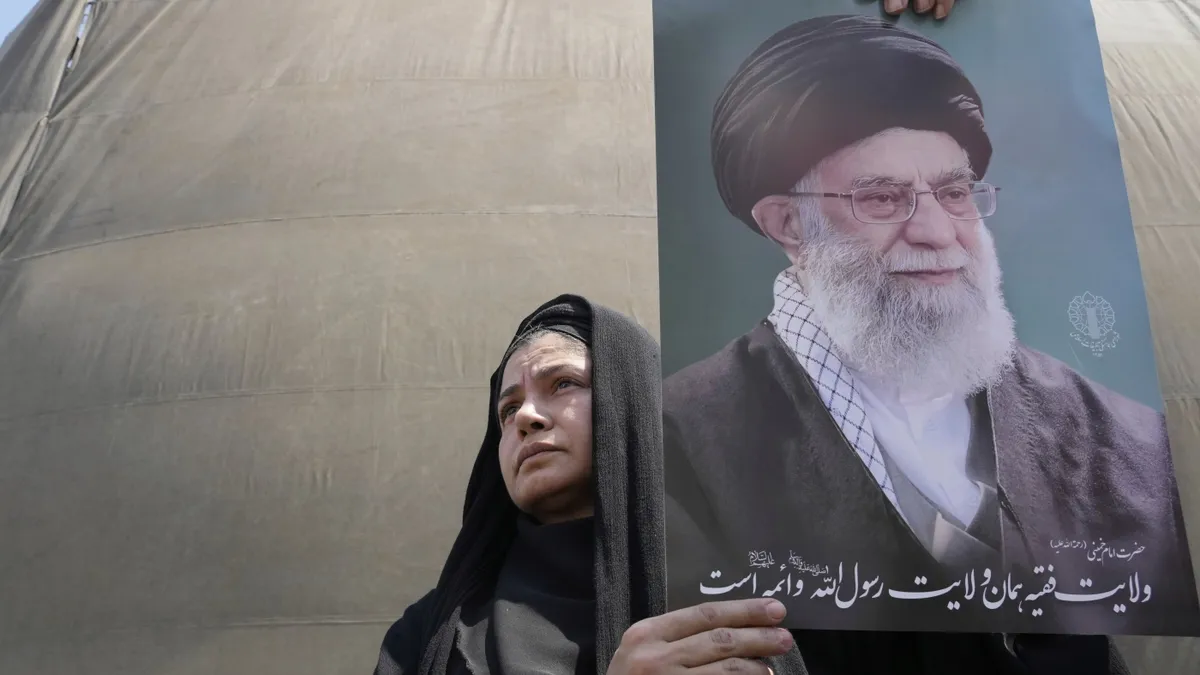
On Wednesday, President Donald Trump refrained from confirming whether the United States is edging closer to a military strike on Iranian nuclear facilities. This comes in the wake of a stern warning from Iran's Supreme Leader, Ayatollah Ali Khamenei, who cautioned the U.S. against any form of military aggression and dismissed Trump's demand for Iran's unconditional surrender. "You don't seriously think I'm going to answer that question," Trump remarked when asked about a potential attack on Iran during a press briefing at the White House. He added, "I may do it. I may not do it. I mean, nobody knows what I'm going to do."
These comments came amidst escalating tensions following nearly a week of hostilities involving U.S. ally Israel and Iran. Iranian officials have expressed concern over the possibility that the Trump administration may be contemplating an offensive against their country. In a series of social media posts on Tuesday, Trump demanded Iran's unconditional surrender and claimed, "We now have total and complete control of the skies over Iran," fueling speculation about the extent of U.S. military involvement in the region.
In response, Khamenei delivered a televised address, marking his second public appearance since Israel initiated attacks on Iranian targets last week. He stated emphatically, "This is a nation that will never surrender to any form of imposition."
On the same day, Trump made a direct threat against Khamenei, asserting, "We know exactly where the so-called 'Supreme Leader' is hiding. He is an easy target, but is safe there – We are not going to take him out (kill!), at least for now." This statement underscores the heightened rhetoric and military posturing between the two nations.
On Tuesday, Trump convened with his national security team in the White House Situation Room for over an hour to discuss the ongoing conflict. This meeting took place shortly after he departed a Group of Seven summit in Canada a day early to focus on what he termed a "real end to Iran's nuclear program." Trump has consistently maintained that Iran must not be allowed to possess a nuclear weapon.
According to a source familiar with the situation, who spoke on the condition of anonymity due to the sensitive nature of the discussions, Israel anticipates that the U.S. will eventually join the offensive against Iran and is currently awaiting a formal decision from Washington.
Despite the escalating military actions, there are indications that diplomatic efforts may be waning. Trump informed reporters that Iranian officials had attempted to initiate negotiations, even suggesting a visit to the White House. However, he claimed he responded, "It's very late." The Iranian mission to the United Nations quickly refuted Trump's claims, stating, "Iran does NOT negotiate under duress" and criticized his threats against Khamenei as cowardly and despicable.
The U.S. was in the midst of discussions with Iran regarding its nuclear program when Israel launched a surprise offensive targeting Iranian nuclear and military sites. Israel contends that these strikes are essential to prevent Iran from developing nuclear weapons, which it views as an existential threat. The Iranian Health Ministry reported that over 200 people have died due to these Israeli strikes, while the Human Rights Activists News Agency claims the toll could be as high as 585 based on independent sources.
In retaliation, Iran has reportedly launched 400 ballistic missiles and 1,000 drones toward Israel, according to the Israeli military. Although many of these incoming attacks have been intercepted, the Israeli Prime Minister's Office reported that the strikes that penetrated their defenses have resulted in 24 fatalities and hundreds of injuries.
On Wednesday, the International Atomic Energy Agency (IAEA), the U.N.'s nuclear oversight body, announced that two centrifuge production facilities in Iran were hit during the recent military actions. Hours after this announcement, the Israeli military confirmed they had targeted a nuclear plant in Iran. Centrifuges are vital for enriching uranium, a critical step in the creation of nuclear weapons. IAEA Director Rafael Grossi stated that it is likely all centrifuges at Natanz, Iran's largest nuclear facility, sustained severe damage from the airstrikes. However, he noted that there appeared to be minimal damage at the underground Fordo enrichment plant, Iran's second-largest facility.
In light of the escalating tensions, the U.S. Embassy in Jerusalem announced it will remain closed through Friday due to security concerns. U.S. Ambassador to Israel, Mike Huckabee, indicated on social media that the embassy is formulating evacuation plans for Americans wishing to leave the region. He advised citizens to register on a government travelers' site to receive notifications about available flights or ships.
With Israel's airspace still closed to commercial flights, tens of thousands of travelers find themselves stranded, both trying to exit the country and return home. Israel's Transport Ministry estimates that as many as 150,000 Israeli citizens are currently abroad. Some foreign nationals have managed to leave Israel through overland routes via Jordan and Egypt, while others have been evacuated by sea. Meanwhile, Israeli airlines have been authorized to conduct emergency flights to repatriate citizens from locations such as Cyprus, France, Greece, and Italy.
As the situation develops, both the U.S. and Israel are closely monitoring the escalating conflict, with implications that could reshape the geopolitical landscape in the Middle East.